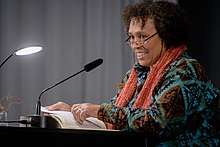Katharina Oguntoye
Katharina Oguntoye (born January 1959 in Zwickau, East Germany)[1] is an Afro-German writer, historian, activist, and poet. She founded the nonprofit intercultural association Joliba[2] in Germany and is perhaps best known for co-editing the book Farbe bekennen with May Ayim (then May Opitz) and Dagmar Schultz.[3] The English translation of this book was entitled Showing Our Colors: Afro-German Women Speak Out. Oguntoye has played an important role in the Afro-German Movement.[2]
Katharina Oguntoye | |
|---|---|
 | |
| Born | January 1959 Zwickau |
| Genre | poetry |
| Literary movement | Afro-German |
Early life
Born in Zwickau, East Germany, to a German mother and a Nigerian father,[4] Katharina Oguntoye was raised in both Nigeria and Heidelberg, Germany.[2] She grew up with a younger brother and recalls their awareness of race and racism as they got older.[1] She describes growing up among other black people, unlike other Afro-Germans. Growing up with her father and other African relatives allowed her to see her Blackness in a positive way and she missed that when she returned to Germany at the age of nine. That move back was hard and she often describes internalized racism and how she has struggled. In a conversation with the other editors of the Showing Our Colors anthology she states: "Because of the time I spent in Africa I'm conscious of the parts of me which are alive there and simply don't exist here in Germany. Because nobody wants to get to know them here, especially not my friends. I think about why that is, and I believe that racist structures prevent us from talking about it. Furthermore, there's a lot of unacknowledged fear underlying this."[5] Oguntoye had much to bring to the conversation.[6]
Poetry
Within Showing Our Colors, Oguntoye features her own poetry, much of which focuses on her own understanding of Afro-Germanness, her Afro-German subjectivity, and the relationship between Afro-German women and white German feminism. Poetry is very important to Oguntoye and she recalls a bad experience with poetry when she was young.[7]
References
- Opitz, May, Katharina Oguntoye, Dagmar Schultz (eds), Showing Our Colors: Afro-German Women Speak Out. University of Massachusetts Press, 1992, p. 212.
- Stefani Messick (6 June 2014). "Meeting w/ Katharina Oguntoye of Joliba Interkulturelles Netzwerk". FemGeniuses.com. Retrieved 28 August 2016.
- May Opitz, Katharina Oguntoye, Dagmar Schultz (eds): Farbe Bekennen. Afro-deutsche Frauen auf den Spuren ihrer Geschichte. Berlin: Orlanda Frauenverlag, 1986; 2. Auflage, 1991, ISBN 3-922166-21-0.
- Anne Thomas, "Berlin marks Black History Month but the struggle goes on", Mixed Race Studies, 16 February 2012.
- Opitz, Oguntoye, Schultz (eds), Showing Our Colors, 1992, p. 160.
- Aija Poikāne-Daumke, African Diasporas: Afro-German Literature in the Context of the African American Experience, LIT Verlag, 2004, pp. 57–59, 99.
- Opitz, Oguntoye, Schultz (eds), Showing Our Colors, 1992, p. 214.
Further reading
- Aija Poikane-Daumke, African Diasporas: Afro-German Literature in the Context of the African American Experience. Münster: LIT Verlag, 2006, ISBN 978-3825896126.